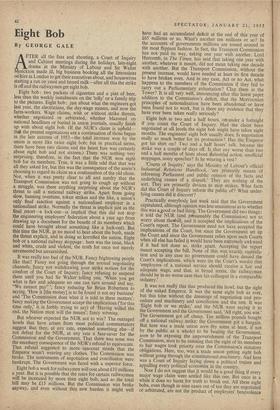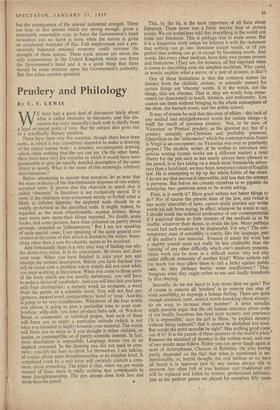Eight Bob
By GEORGE GALE FTER all the fuss and shouting, a Court of Inquiry and Cabinet meetings during the holidays, late-night drama at the Ministry of Labour and Sir Walter Monckton made ill, big business booking all the limousines on hire in London to get their executives about, and housewives starting a run on yeast and tinned milk—after all this the strike is off and the railwaymen get eight bob.
Eight bob : two packets of cigarettes and a pint of beer, less than the weekly instalments on the `telly' or a family trip to the pictures. Eight bob : just about what the engineers got last year, the electricians, the day-wage miners, and now the farm-workers. Wage claims, with or without strike threats, whether negotiated or arbitrated, whether blazoned on national headlines or buried in union journals, usually finish up with about eight bob. (If the NUR's claim is upheld- thilt the present negotiations are a continuation of those begun in the late autumn of 1953—the total increase won by the union is more like twice eight bob; but in practical, terms, there have been two claims and the latest fuss was certainly about eight bob and not sixteen.) There was nothing very surprising, therefore, in the fact that the NUR won eight bob for its members. True, it was a little odd that that was all they asked for, but this was the consequence of the union's choosing to regard its claim as a continuation of the old claim.
Nor, when it was pretty clear to all and sundry that the Transport Commission was not going to cough up without a struggle, was there anything surprising about the NUR's threat to call a national railway strike. Apart from going slow, banning overtime, token strikes and the like, a union's only final sanction against a nationalised employer is a nationalised strike. Normally the threat is implicit just as the final retort—a lock-out—is implicit (but this did not stop the engineering employers' federation about a year ago from drawing up a document for the benefit of its members which could have brought about something like a lock-out). But, this time the NUR, jp no mood to beat about the bush, made the threat explicit, and in doing so horrified the nation. Eight bob or a national railway stoppage : here was the issue, black and white, crude and violent, the truth for once not merely unveneered but unvarnished.
It was really too bad of the,NUR. Fancy frightening people like that! Fancy not going through the normal negotiating channels; fancy not withdrawing your strik6 notices for the comfort of the Court of Inquiry; fancy refusing to suspend them until you had Sir Walter telling you, 'When you get what is fair and adequate no one can turn around and say, "We cannot pay"': fancy reducing Sir Brian Robertson to saying, 'How it [the money] is to be found is not my business' and 'The Commission does what it is told in these matters'; fancy making the Government accept the implications (`for this time only,' it is feebly trying to say) of 'Having willed the end, the Nation must will the means'; fancy winning.
But whoever expected the NUR not to win? The outraged howls that have arisen from most political commentators suggest that they, at any rate, expected something else—if not defeat for the NUR, at any rate a face-saver for the Commission and the Government. That there was none was the neceAsary consequence of the NUR's refusal to equivocate. That refusal suggested to more innocent minds that the Emperor wasn't wearing any clothes. The Commission was broke. The instruments of negotiation and conciliation were bankrupt. The Government was faced with a superior force. Eight bob a week for railwaymen will cost about £10 millions a year. But it is possible that the rates for certain railwaymen will be increased by more than eight bob, and so the total bill may be £15 millions. But the Commission was broke anyway, and even without this new burden it might well have had an accumulated deficit at the end of this year of £65 millions or so. What's another ten millions or so? In the accounts of governments millions are tossed around in thb most flippant fashion. In fact, the Transport Commission has not paid its way, taking one year with another. Lord Hurcomb, in The Times, has said that taking one year with another, whatever it meant, did not mean taking one decade with another. But the Transport Commission, without the present increase, would have needed at least its first decade to have broken even. And in any case, Act or no Act, what happens to the members of the Commission if they fail to carry out a Parliamentary exhortation? Clap them in the Tower? It is all very well, announcing after this latest paper addition to the Commission's deficit, that the Morrisonian principles of nationalisation have been abandoned or have been found not to work, but is there any evidence that they have ever been taken really seriously?
Eight bob in two and a half hours, on under a fortnight if you count the Court of Inquiry. Had the claim been negotiated at all levels the eight bob might have taken eight months. The engineers' eight bob usually does. Is negotiation really so much better for its protraction? Has the Emperor got his shirt on? Two and a half hours' talk, because the strike was a couple of days off. Is that any worse than two and a half months of hints about ilidustrial action, unofficial stoppages, noisy speeches? Is he wearing a vest'?
`Courts of Inquiry,' says the Ministry of Labour's official Industrial Relations Handbook, 'are primarily means of informing Parliament and public opinion of the facts and underlying causes of a disputb.' They are nothing of the sort. They are primarily devices to stop strikes. What facts did this Court of Inquiry inform the public of? What under- lying causes did it discover?
Practically everybody last week said that the Government capitulated, although opinion.was less unanimous as to whether this was mood or bad thing. The Government did two things: it told the NUR (and prbsumably the Commission) not to worry about theebillt and it accepted the implications of the Court's report. The Government need not have accepted the implications of the Court, but since the Government set Up the Court and since the Government relies upon such Courts when all else has failed is would have been extremely awkward if it had not done so, strike , apart. Accepting the .report meant accepting the bill. None of this was exactly capitula- tiOn and in any case no government could have denied the Court's implications, which were (in the Court's words) that `employees of a national service should receive a fair and adequate wage, and that, in broad terms, the railwayman should be in no worse case than his colleague in a comparable industry.'
It was not really this that produced the howl, but the sight of the nak,ed Emperor. It was the same eight bob as ever, but this Ole without the dressings of negotiation and pro- cedure and machinery and conciliation and the rest. It was `Eight bob or we strike,' and the NUR were saying it to the Government and the Government said. `All right, you win.' The Government got off cheap. Ten million pounds bought off a national railway strike; the Government got a bargain.
But here was a trade union seen (by some at least, if not by the public as a whole) to be beating the Government, seen to be exposing the impoverishment of the Transport Cqmmission, seen to be insisting that the right of its members to fair wages took priority over the Commissions statutory obligations. Here, too, was a trade union getting eight bob without going through the constitutional,machinery. And here was a Court of Inquiry laying down a political truism and appalling every political economist in the country.
Now I do not suggest that jt would be a good thing if every major wage claim were settled like this one. But once in a while it does no harm for truth to break out. All these eight bobs, even though in nine cases out of ten they are negotiated or arbitrated, are not the product of employers' benevolence but the consequence of the unions' industrial strength. There are four or five unions which are strong enough, given a reasonably reasonable case, to force the Government's hand nowadays and, no harm is done when the nation is given an occasional reminder of this. Full employment and a pre- cariously balanced national economy vastly increase the .strength of these unions. These trade unions are about the only corporations in the United Kingdom which can force the Gdvernment's hand and it is a good thing that there should be some restraint upon the Government's authority. But that raises another question.



































 Previous page
Previous page